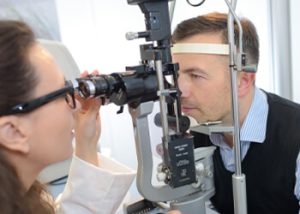Recovery Time for Cataract Surgery — What You Need to Expect
In today’s fast-paced world, taking off an extended period from work and your usual activities can be a luxury many don’t feel they can afford. However, the other reality is that your eye surgeon has recommended you undergo cataract surgery, which naturally comes with a bit of required downtime. To understand more about the expected recovery time for cataract surgery, keep reading.
Recovery Time for Cataract Surgery
Although some people feel alright with their vision as soon as within a few days after their cataract operation, it typically takes a full four to six weeks for your cataract surgery recovery to be complete. Each individual case may vary slightly, especially if you have pre-existing risk factors or if an unlikely complication occurs during or after your procedure, but your eye surgeon will probably advise you of the following time frames regarding recovery time for cataract surgery.
Work
Your return to work is largely based on the activities of your occupation. If your vocation involves mainly sedentary deskwork, such as accounting or IT, you may return to your job after about a week of cataract surgery recovery time. If all is healing as expected, your sight should be adequate for reading paperwork and your computer screen, though you may need frequent lubricating drops and breaks to alleviate eye fatigue in the early weeks. Most people will also require reading glasses to perform their near work easily.
However, if your occupation requires heavy labour or there’s a risk of contamination to your eye or head or face injury, your eye surgeon may advise you to take a longer period of leave. Such vocations can include the military, outdoor work such as gardening or construction, cleaners, and professional athletes in contact sports. Returning to these activities too early can put your eye at a risk of injury or infection, which will only prolong your recovery time for cataract surgery.
Driving
Around Australia, each state or territory’s road transport authority stipulates a minimum visual acuity requirement to hold a driver’s licence. This requirement varies depending on whether you’re applying for a private car licence, commercial licence, or heavy vehicle licence. Even if your vision feels quite good soon after your cataract surgery, it’s best to wait until you’ve had a review with your eye surgeon before returning behind the wheel. Ensuring your sight is at the right point in your cataract surgery recovery journey is safest for everyone on the road.
Water
This sounds like an odd thing to be discussing in regards to cataract surgery recovery, but it’s an important one. Unless it’s been boiled or somehow sterilised, water contains quite a lot of pathogens. While we often safely drink water straight from the tap, getting unsterile water into a healing wound can be dangerous.
Personal hygiene remains important, however, it’s a good idea to avoid washing your hair in the shower for the first week into your cataract surgery recovery. You may ask someone at home to help you wash your hair while you recline backwards to avoid any water running into your eyes or see if your local hairdresser can assist.
You will also want to avoid swimming, jacuzzis, and saunas for the first month after your cataract operation. Swimming includes in a swimming pool (even your private one), the beach, and rivers or lakes.
Tips for Your Recovery Time for Cataract Surgery
Immediately after your cataract surgery, you can expect your eye to feel uncomfortable and your sight to be slightly blurry. Other normal findings in the first few days after a cataract operation include: 
- A gritty or sandy sensation in the eye
- Redness
- Slight swelling around the eye
- Glare sensitivity
- Wateriness
Most people will typically find their sight begins to clear rapidly after the first day. However, it can take up to 6 weeks for your vision to stabilise completely as the cornea continues to heal from the incision made during surgery and the intraocular lens implant settles. During this time, you will find your sight may fluctuate slightly. For this reason, your cataract surgeon will advise that you wait before updating any spectacle or contact lens prescriptions with your optometrist.
After your operation, you’ll be given some tips on how to reduce your risk of complications. These instructions will include:
- Ensuring you use your medicated eyedrops as prescribed. You may have one to three bottles of prescription drops to use during your cataract surgery recovery period. These medications help to control inflammation and protect you from the risk of infection.
- Advice on avoiding any movements that can raise the head and eye pressure. Although some can be hard to avoid – such as coughing, sneezing, or vomiting – you should also try to avoid bending over or turning upside down and lifting heavy objects.
- Keeping products away from your eye as it heals. This includes moisturisers or other lotions, soaps, facewash or other skin products, and cosmetics. It’s also a good idea to ensure that aerosols such as perfumes or deodorant don’t drift into your face.
- Avoid environments that are dirty or dusty. This includes the garden or the park on a windy day, and even particularly dusty areas of the house.
If you feel like something is not quite right during your cataract surgery recovery process, contact your cataract surgeon by calling at (03) 9070 3580 today for a consultation.
Note: Any surgical or invasive procedure carries risks. Before proceeding, you should seek a second opinion from an appropriately qualified health practitioner.
References
Recovery: Cataract Surgery.
https://www.nhs.uk/conditions/cataract-surgery/recovery/#:~:text=These%20side%20effects%20usually%20improve,healed%2C%20usually%20after%206%20weeks.
8 tips to reduce cataract surgery recovery time.
https://www.allaboutvision.com/en-au/conditions/cataract-surgery-recovery/
How soon can I go swimming after surgery?
https://www.nhs.uk/common-health-questions/operations-tests-and-procedures/how-soon-can-i-go-swimming-after-surgery/






Leave a Reply
Want to join the discussion?Feel free to contribute!